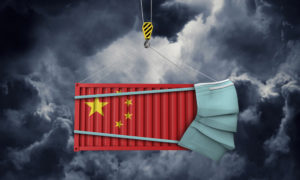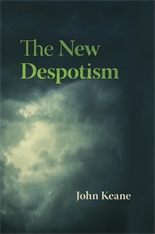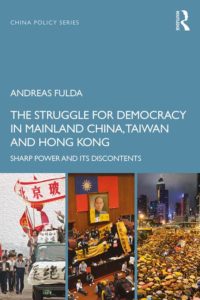China’s “Wolf Warrior diplomacy” is an insult to wolf warriors https://t.co/vO8Pu9QT91
— The Economist (@TheEconomist) June 1, 2020
China’s leadership relishes its role as an ideological challenge to the West and the latter’s practice of liberal democracy, notes Ian Brzezinski, a senior fellow in the Transatlantic Security Initiative. China uses its economic, technological, and military power to promote globally its form of national authoritarianism. Beijing even asserts that its political model has provided the most adept and agile response to today’s coronavirus epidemic.
NATO is well positioned to foster that collaboration with the leading states of the Indo-Pacific, he contends. Such NATO engagement would help underscore that Beijing’s belligerence risks provoking a geopolitically costly reaction from a vibrant and unified global coalition of democracies.

NED Forum/shutterstock
Secretary of State Mike Pompeo on Sunday said China has become “more aggressive” in its efforts to spread disinformation and cause disruption across the world, from Hong Kong to the United States, Politico reports.
“It’s a different Chinese Communist Party today than it was 10 years ago,” Pompeo said. “This is a Chinese Communist Party that has come to view itself as intent upon the destruction of Western ideas, Western democracies, Western values. It puts Americans at risk.”
“This is deeply embedded in an ideology. This is bigger than any one person. The threat from the Chinese Communist Party emanates from the nature of the Chinese Communist Party doctrine and ideology,” Pompeo added. “We’re gonna have to be at this for a while.”
Council on Foreign Relations analyst Jerome A. Cohen explains what to know about China’s new national security legislation.
This was supposed to be about the time when China’s dictatorship collapsed, to be replaced by a bright democratic dawn, according to the consensus of elite US opinion dating from the 1990s until very recently. Instead, it’s the US governance model now on the defensive while China’s is apparently ascendant, analyst Peter Hartcher claims in The Sydney Morning Herald.
 John Keane, a professor of political science at Sydney University, says: “I think this is one of the great golden or historical moments for the Chinese empire. We have the US as a republic and as an empire showing all the signs of a degraded country and an empire in decline.” In Keane’s latest book, The New Despotism, he says that China is only one of a growing number of despotic states, but it is “the leader of the pack”.
John Keane, a professor of political science at Sydney University, says: “I think this is one of the great golden or historical moments for the Chinese empire. We have the US as a republic and as an empire showing all the signs of a degraded country and an empire in decline.” In Keane’s latest book, The New Despotism, he says that China is only one of a growing number of despotic states, but it is “the leader of the pack”.
At a time of heightened geopolitical tensions between the US and Communist Party-led China, Europe can no longer afford Germany’s unprincipled and failed China policy of ‘change through trade’, argues Andreas Fulda, a Senior Fellow at the University of Nottingham Asia Research Institute and author of The Struggle for Democracy in Mainland China, Taiwan and Hong Kong: Sharp Power and Its Discontents.
 In 2020, it is abundantly clear that the ruling CCP did not liberalise and democratise as a result of German car manufacturers enriching themselves by selling cars to China, he writes for the RUSI think-tank:
In 2020, it is abundantly clear that the ruling CCP did not liberalise and democratise as a result of German car manufacturers enriching themselves by selling cars to China, he writes for the RUSI think-tank:
Since the political situation in mainland China and its periphery has deteriorated to such a great extent, business as usual is no longer an option. What is now required is a Europe-wide approach which repositions the EU in light of Xi’s increasing totalitarianism. While trade clearly matters, European values need to be defended, too. Chancellor Merkel should abandon her failed China policy and join Europe’s search for a more principled approach towards China.
To diplomatic and national-security hawks in Beijing, if some countries have to feel pain in order to understand that China’s rise is inevitable and that resistance is futile, then that pain is itself a useful education, The Economist adds. Nor is this approach about to stop. Reporters at the annual meeting of China’s legislature, the National People’s Congress, asked the foreign minister, Wang Yi, about “Wolf Warrior diplomacy”. He did not endorse the term but embraced its spirit.







